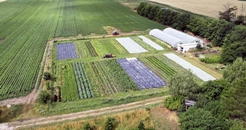 Tiny farms
Tiny farms
From an article by Reasons to be Cheerful
In Germany, a new model of low-cost, very small-scale farming is luring young people who value flextime and vacations.
It’s all unfolding on less than one hectare — a new kind of farm for a new kind of farmer: one who is likely younger, lives in the city and holds another job. These “tiny farmers” commute to the countryside, do the necessary field work, and then, from back at home, manage their farms via smartphone. It’s agriculture customized for the work-life balance generation.
In Berlin, three days a week, the farmers commute to the countryside by train and bicycle, to work the land owned by Tiny Farms, which pays them for their labour. They are part-time farmers, so to speak, alongside their other occupations in the capital. “I’m working in agriculture, which is something I’ve always wanted to do, and I can still be part of the international cultural scene in Berlin,” says one of the farmers.
The concept fills a gap in the market: organic markets in Germany often stock vegetables from far-flung parts of the country, southern Europe, or further afield. Tobias Leiber and Jacob Fels, the founders of Tiny Farms say “We need new hands and minds in agriculture. It’s the only way to solve one of the industry’s biggest problems: fewer and fewer people want to work in vegetable farming. In Berlin, only three to five percent of vegetables come from regional cultivation. In Nuremberg, on the other hand, the front-runner in terms of consumption of regional food, it’s one-fifth. That’s the potential we’re targeting.”
Tiny Farms wants to spark the creation of a swarm of microfarms that can be run by their operators alone or collectively, full-time or part-time. The idea is that clusters of these farms can supply regional food to supermarkets, caterers, restaurants or school kitchens within a maximum radius of 100 kilometers. The startup trains the farmers of tomorrow in its academy, develops cultivation plans, supplies seeds and handles organic certification. Above all, the team at Tiny Farms in Berlin takes care of selling and transporting the products grown on the land of the farmers.
Tiny Farms is developing a digital portal with work instructions and tools for crop planning. Shortly before a farmer harvests a bed, they can find information there about exactly what customers are looking for, and take this into account while planning their next planting. This solves one of the biggest problems faced by many large farms, which operate on rigid, long-term crop planning cycles and plant without knowing who will buy them later. Last year, Tiny Farms says it sold 97 percent of what was grown.
The biointensive farming used by Tiny Farms relies on compost, green manure, a sophisticated crop rotation, tilling the soil only superficially and close plant spacing. Biointensive farms can use 50 to 75 percent less land and 94 to 99 percent less energy to produce a given amount of food than conventional farming. The farm gets by on 2,000 kilowatts of electrical power annually. There’s no need for a refrigerated container because they deliver just in time. Tiny Farms has standardized a lot of things — the locations of the containers and the paths between the beds, the planting distances, the working equipment, the planning software — all of which keeps costs and labour down.
According to the startup’s calculations, a Tiny Farm of half a hectare can generate a revenue of 60,000 euros. If the farmer purchases the total package of modular bookable services from Tiny Farms, that leaves them with about 23,000 euros a year in profits for part-time work.
A thousand farms by 2030 is the company’s ambitious goal. According to the business plan, Tiny Farms should be in the black with as few as 25 farms.
Read the full article here.
Retweet abut this article:
From an article by Reasons to be Cheerful, 18/01/2023